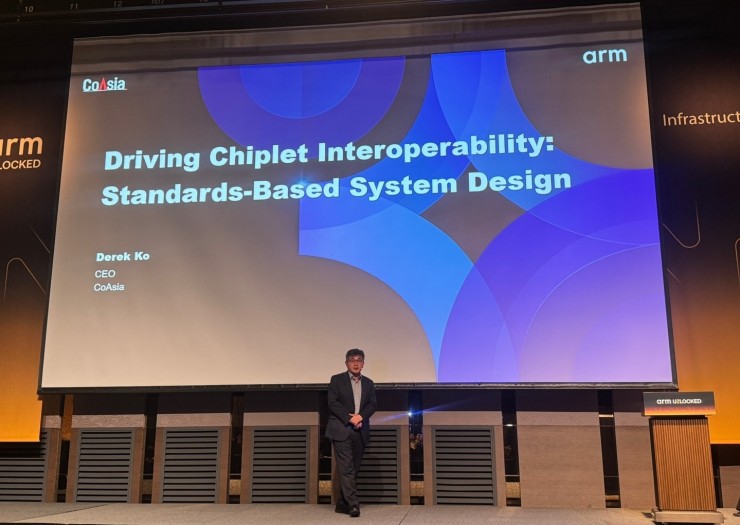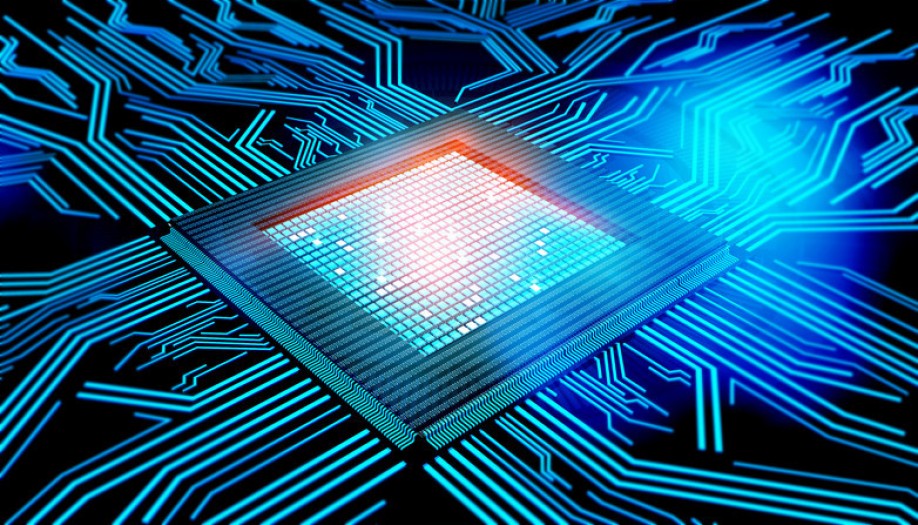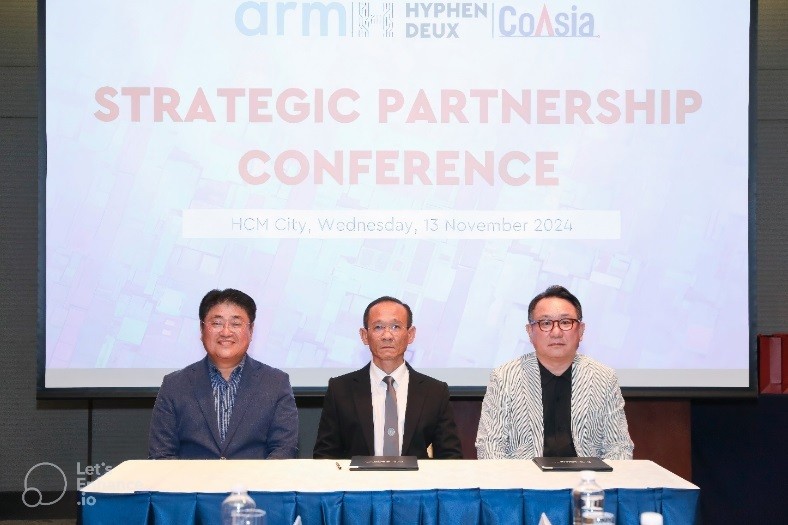NEWS
CoAsia Nexell Now
Scroll

CoAsia SEMI (CEO DS Shin) unveiled its proprietary chiplet-based CoCs™ (CoAsia Chiplet Solution) platform for the first time at 'Arm Unlocked Seoul 2025' on Tuesday, October 21.'Arm Unlocked Seoul 2025' is a technology leadership summit hosted by the British semiconductor company Arm, designed to share the latest technologies using Arm-based platforms, from cloud to edge, and future industry trends in AI computing. About 500 officials attended, including global tech companies like Samsung, Cadence, and Synopsys, as well as semiconductor partners and industry leaders.CoAsia SEMI and CoAsia Nexcel, representing CoAsia's system semiconductor division, participated in the event together, jointly introducing the next-generation chiplet platform CoCs™. The presentation was given by CoAsia Nexcel CEO Koh Dae-hyup under the theme 'Driving Chiplet Interoperability: Standards-Based System Design'.CEO Koh emphasized, "With the rapid spread of AI and High-Performance Computing (HPC), computing performance requirements and systems are becoming more complex. As fine-grained processes to make things smaller advance, the burdens of leakage, heat generation, and cost increase, revealing the limitations of the 'Moore-style expansion' method of simply increasing the density of transistors." He added, "A new alternative is needed that can balance various power and performance requirements."In this industrial environment, CoAsia SEMI is focusing on enabling customers in the HPC and AI fields to quickly implement SoCs without complex processes, utilizing the Arm Neoverse V3 architecture based on its official Arm Total Design partnership. Furthermore, the company plans to flexibly respond to bridging the gap in the high-performance, low-power competition required in the AI domain by newly proposing its own chiplet architecture platform, 'CoCs™', as an alternative that can reduce costs while enhancing design efficiency and scalability.CEO Koh explained that 'CoCs™' has a chiplet structure that implements a single system by combining chips (Dies) separated by function, allowing it to be configured by modularizing only the necessary functions. Its strength lies in realizing custom AI/HPC SoCs tailored to customer needs quickly and stably by implementing the server-grade performance and scalability of Arm Neoverse V3 through CoCs™ chiplet modularization, thereby maintaining a balance of Performance, Power, and Area (PPA). This can significantly shorten the time-to-market.Initial risks were lowered in the design phase by using a pre-verified Compute Sub-System (CSS) utilizing Arm Neoverse V3. In the physical implementation phase, power efficiency was increased and chip area was compressed through an iterative optimization process. Interoperability between each chiplet was also enhanced with a SW Stack for a Standardized Chiplet Interface.DS Shin (Dong-Soo Shin), CEO of CoAsia SEMI (who also heads the CoAsia Group's Semiconductor Division), stated, "Our company is further strengthening its end-to-end integrated support service for customer-specific chiplet SoCs, covering everything from design to packaging, testing, mass production, and supply chain management." He added, "CoCs™ can effectively respond to interconnect reliability issues and mass production yield management that may occur in a multi-die environment. Through this, we will secure a differentiated competitive edge by reducing our customers' design and development cycles."
#Chiplet # Arm

Korea-based semiconductor design specialist CoAsia announced on the 26th that it has secured a project to develop a network switch for data centers from India's CIMware.CIMware is a deep-tech startup recognized by the Department of Telecommunications of the Indian government, specializing in data center engineering and next-generation Top-of-the-Rack (ToR) smart network switches.With the rising demand for rapid and extensive data processing in data centers, CIMware plans to develop a PCIe NTB (Non-Transparent Bridge)-based network switch to deliver industry-leading performance and energy efficiency through its Composable Infrastructure Module (CIM).CIM is a modular infrastructure designed to improve data center performance and efficiency while significantly reducing the Total Cost of Ownership (TCO).CoAsia secured this project through close collaboration with India’s Semiconductor Fabless Accelerator Lab (SFAL), successfully identifying and partnering with local fabless companies in India.Recently, the Indian government has introduced aggressive support measures to foster the semiconductor industry, including funding for semiconductor plant construction. As a result, global semiconductor giants such as Samsung Electronics, TSMC, NXP, and Micron are expanding their investments in R&D, production, and packaging facilities in India.
#First Chip Design Order# Indian Data Centers

CoAsia, a specialized system semiconductor design company, announced on the 14th that it has signed a contract with Hyphen Deux, a Vietnamese edge artificial intelligence (AI) semiconductor specialist, for the design and supply of AI Vision Processor semiconductor products.As an Arm Approved Design Partner (AADP) of the global semiconductor IP company Arm, CoAsia secured this project by providing a total solution based on Arm's architecture. Notably, CoAsia collaborated with Arm from the initial prototype stage to prepare scenarios, which led to the successful contract signing. Hyphen Deux is recognized as one of Vietnam's leading semiconductor design companies, alongside Viettel and FPT, and supplies edge AI vision solutions to various industries, including smart cities, smart homes, and smart cars.The Edge AI Vision Processor combines AI and Image Signal Processing (ISP) technologies. It is designed to be embedded in devices requiring intelligent vision analysis, such as IoT, security systems, and medical equipment. The two companies plan to begin development this year and aim for mass production by 2026, with expected revenues exceeding $100 million (approximately KRW 140.6 billion).Bui Duy Khanh, CEO of Hyphen Deux, stated, "It is highly meaningful for Hyphen Deux, a fast mover in Vietnam, to partner with CoAsia to enhance our AI Vision solution capabilities and business vision. With CoAsia's advanced process references and skilled global design engineers in Vietnam, we anticipate creating synergies and achieving significant results in the rapidly growing AI semiconductor market in Vietnam in the mid to long term."Hwang Sun Wook, President of Arm Korea, commented, "Arm supports various companies, including startups, in developing AI solutions in an open and efficient manner. We will continue to strengthen Arm's presence in the emerging Southeast Asian market and collaborate to empower Arm partners to thrive."Shin Dong Soo, President of CoAsia's Semiconductor Division and CEO of CoAsia Semi, remarked, "This collaboration with Hyphen Deux, a company with outstanding technology and ideas rooted in digital innovation, presents a significant opportunity for growth in Vietnam and the global market. CoAsia will continue to uncover turnkey business opportunities in the global market through partnerships with Arm and other key players."
#Vietnam#AI ISP Semiconductor Chip